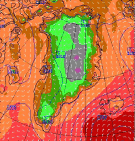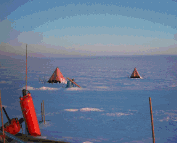As one of the esteemed scientists working with the Intergovernmental Panel on Climate Change (IPCC), David Bromwich’s research — conducted, in part, at the Ohio Supercomputer Center — on the changes in polar atmospheric circulation and Antarctic climate variability contributed to winning this year’s Nobel Peace Prize.
 Former Vice President Al Gore and the IPCC were presented the honor Monday (Dec. 10) in Oslo, Norway. The Norwegian Nobel Committee selected Gore and the IPCC for “their efforts to build up and disseminate greater knowledge about man-made climate change.”
Former Vice President Al Gore and the IPCC were presented the honor Monday (Dec. 10) in Oslo, Norway. The Norwegian Nobel Committee selected Gore and the IPCC for “their efforts to build up and disseminate greater knowledge about man-made climate change.”
“This recognition further increases the visibility of this critical global issue and challenges mankind to find ways to live more harmoniously with nature while enhancing the quality of life for everyone,” said Bromwich, an Ohio State University researcher.
The IPCC does not conduct any research itself; rather, the panel collaborates with hundreds of scientists from around the world who conduct research on global warming.
As a senior research scientist at OSU’s Byrd Polar Research Center and a professor with the atmospheric sciences program of the department of geography, Bromwich works with other research scientists to decipher climate change. Because they needed to better simulate the unique weather and climate over the earth’s polar regions, the research team developed customized computer weather prediction models specifically for use over high latitudes.
 Bromwich and his colleagues use these models for a variety of applications, including forecasting weather for the U.S. Antarctic Program, studying the general climates of polar regions and their influences on the world’s climates, predicting the growth/decline of the Greenland and Antarctic Ice Sheets and their impact on sea level, and simulating past climates, such as the Last Glacial Maximum of about 20,000 years ago, to gain perspective on variability of current climate.
Bromwich and his colleagues use these models for a variety of applications, including forecasting weather for the U.S. Antarctic Program, studying the general climates of polar regions and their influences on the world’s climates, predicting the growth/decline of the Greenland and Antarctic Ice Sheets and their impact on sea level, and simulating past climates, such as the Last Glacial Maximum of about 20,000 years ago, to gain perspective on variability of current climate.
“These atmospheric models are based on equations, which are solved at thousands of points on a three-dimensional grid placed over an area of interest on the globe,” Bromwich said. “And, these equations need massive computational power to complete. By tapping the resources and expertise at the Ohio Supercomputer Center for the past two years, we’ve had a local partner that enables us to generate model results, determine the causes of the simulated changes, and store the data.”
In addition to participating in the Nobel Peace Prize, Bromwich recently received a 2007 International Polar Year grant from the National Science Foundation. This $1.1 million award will aid the development of the Arctic System Reanalysis, a project that will create models of the Arctic climate system, as well as analyze historical data of the region. Working on this research study and others, Bromwich plans to continue his collaboration with OSC, using the Center’s IBM Opteron cluster.
“Through access to thousands of processors and terabytes of disk storage, we take great pride in providing the right environment for international leaders like Dr. Bromwich to carry out their world-altering research,” said Jim Giuliani, who as OSC’s client and technology support manager helps researchers convert computer codes to efficiently access the center’s supercomputers.
Note to Editors: High-resolutions images are available upon request.
Celebrating 20 years of service, the Ohio Supercomputer Center (OSC) is a catalytic partner of Ohio universities and industries that provides a reliable high performance computing and high performance networking infrastructure for a diverse statewide/regional community including education, academic research, industry, and state government. OSC promotes and stimulates computational research and education in order to act as a key enabler for the state's aspirations in advanced technology, information systems, and advanced industries. For additional information, visit http://www.osc.edu.